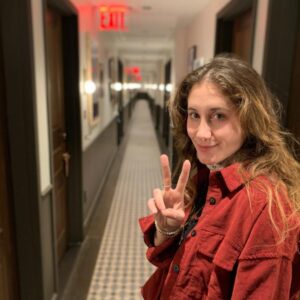For your reading pleasure, please enjoy this exclusive preview from Issue 48 of Backstory. If you enjoy what you read below – we hope you’ll join us to read the rest of the issue by subscribing to Backstory Magazine!
Leigh Cesiro and Erica Matlin on going from being camp buds to partnering on a story about friends finding a body at camp that landed them on the Black List.
By Danny Munso
When Erica Matlin saw the 2021 Black List, she immediately called her writing partner and friend of over 15 years Leigh Cesiro to celebrate. After all, their script Cruel Summer, the deeply funny and sometimes moving ode to summer camp, had made the coveted compendium. But Cesiro didn’t pick up on the first call. Or the second. Or the third. It turns out Cesiro was still sleeping, having spent all night in the emergency room thanks to a kitchen mishap that led to a sliced finger. But the pair finally connected and celebrated virtually since Cesiro lives in L.A., and Matlin was in New York. And then that evening, Matlin tested positive for COVID. “We had a celebratory 10 hours,” she laughs. “But it was exciting to have something you wrote in your room with your friend be out there.”
Cruel Summer follows five camp counselors who discover a dead body in the woods. And summer camp isn’t just the location of the story, it’s the reason the script exists in the first place. Cesiro and Matlin first met at Camp Westmont in the Pocono Mountains of Pennsylvania, where Cesiro was Matlin’s camp counselor. Their friendship didn’t solidify till a few years after that, when Cesiro returned to be a group leader at the camp in her early 20s and Matlin was back working as a counselor herself. But even before breaking from her ad gig, Cesiro had started immersing herself in the comedy scene in New York, specifically improv with the famed Upright Citizens Brigade. A friendship formed, Matlin joined her in New York after she finished college and started studying acting while also working in the film industry on the production side of things. And slowly that friendship turned into a writing partnership.
In 2019, they made a return visit to Westmont to see some friends and began to wonder why they had never thought about setting a script at a location that had such mutual significance. Their minds wandered to an interesting what-if: What if you found a dead body in the woods? They surveyed their friends at camp. “We asked someone what they would do, and they said, ‘I’d bury it and run away,’ ” Cesiro recalls. “It was a real-life focus group of getting answers from everyone.” The varying responses helped cement the premise in the writers’ minds. “Everyone’s answer was completely different, and I think that’s what got the wheels turning,” Matlin says. “One of our friends who is very much a rule follower said, ‘I would pretend I didn’t hear anything and would walk away.’ Everything kind of happened very organically from there. Not easily, but organically.” The story is an ensemble made up of best friends Sam and Jayne and their fellow Camp Brower counselors Alexis, Benji and Grunch. (If the name “Grunch” wasn’t evocative enough, Cesiro and Matlin fill in the blanks for the reader by describing him as someone who “drinks non-dairy milk years before anyone thought to milk an oat.”) During a night walk in the woods near camp, they stumble upon a man’s body. Worst of all, they think they may have been responsible for the death. The group makes numerous hilarious attempts to hide the body with varying degrees of success, all while trying to avoid getting caught. Meanwhile, Sam is keeping a secret from Jayne about their future that may affect the friendship.

Leigh Cesiro
Cesiro and Matlin’s process begins with crafting a detailed outline—or, as Cesiro puts it, “outlining to death.” After Cesiro moved to Los Angeles, in 2020, the duo began using WriterDuet, which allows multiple writers to work on a script simultaneously, but they will also occasionally split up sections of the script and work independently before sharing with the other. As they’ve learned, writing with a partner has its benefits…and its drawbacks. “The biggest issue is we’re friends so we can’t help but dick around,” Matlin laughs. “Then hours have gone by and we go, ‘My goodness, what have we done today?’ But being friends also helps when writing a script like Cruel Summer, because we’re trying to make each other laugh.”
The tone is what makes this script truly special, as they’ve succeeded in balancing the humor against real-world stakes. Though the counselors sometimes go Weekend at Bernie’s with their found corpse, the fact that they may have been responsible for a murder is treated seriously, or as seriously as it can be in a comedy. We as readers feel the weight the counselors are carrying. “A dead body is a very real thing,” Matlin says, “so when the body comes into camp, how does everything mesh, and how do you accurately tell the story so that people are laughing and also feeling along with your characters?” Getting the balance down was also crucial to one of the key scenes in the script. At the end of the second act, Sam and Jayne get in a massive fight. Sam hadn’t told Jayne about her plans to skip camp the next summer to study abroad, and Jayne is hurt not only that Sam is abandoning her but that she was the last of their group to find out.

Erica Matlin
Since so much of the screenplay is outwardly funny, they needed to nail the emotions underpinning this pivotal scene. “It’s a balancing act,” Cesiro says. “When you’re 19 and you’re at camp, everything is so important, and you think everything is the end of the world. But the tone of the movie really isn’t like that, so there was a lot of rewriting of how to get it just right, and what would they be fighting about? It’s the end of the world to them, so how do we make that stick with the tone of the rest of the story? You know as a [reader of the script] that two 19-year-olds fighting about their friendship is not the end of the world, but it was about respecting that at 19 they would feel that way. At the same time, it’s a lighthearted movie, so it was about finding the right amount of heavy. I think we were very conscious of knowing the main goal was to be funny, but it’s not satisfying if the characters are not emotionally resolved at the end.”
Cruel Summer is set in the 1990s for a simple reason: The writers wanted to avoid the characters having cell phones that give them an easy out on a number of scenes. Because of that decision, the script is full of pop-culture references to that decade, particularly in the music. Celine Dion’s 1996 hit “It’s All Coming Back to Me Now” is featured in a few prominent scenes, as is Savage Garden’s “I Want You,” a song that isn’t the most obvious ’90s hit, but if you were alive at that time, you’ve definitely heard it. And that’s kind of the point. “Savage Garden is not something you think back on and say, Oh, I loved Savage Garden,” Cesiro says. “It’s, Oh yeah—them. It’s not top of mind as a reference for the ’90s but you also don’t want to go too obscure. You want to go just under the obvious and get the light bulb of recognition.” It’s a small part of what makes the script such a quick and fun read. And the zeitgeist references don’t end there, as Cesiro and Matlin also invoke movies of any time period, such as Jurassic Park or Whiplash in their scene direction to give readers a more visceral—and hilarious—picture of a scene.
The two signed with a management company off the strength of the script and the project was sent out to prospective companies in 2021. It garnered the pair a lot of meetings, some ending with interest in Cruel Summer itself and others in working with the duo on a different project. “It’s been a mix,” Matlin says of the reception. “We met with people who loved the script but can’t make the script and want to know what else we’re working on. They want to find ways to work together, and that’s exciting. It’s also hard to make anything right now. I work as a producer, so I’m seeing it on both sides and it can be really challenging.” One company even wondered if the feature could possibly work as a TV series. They writers have also had to deal with the inescapable, contradictory weirdness of Hollywood. “Something that has come up in the meetings we’ve had is we’ve been told, ‘Camp is too niche,’ but we also get, ‘We can’t take this on because we [already] have a camp project going on,’ ” Cesiro notes. “So how do those two things reconcile?” That remains to be seen.
In the meantime, the two are more than busy. Cesiro is developing a TV pilot and also writes Vulture’s weekly comedy podcast roundup, while Matlin works as director of development and production at Likely Story, where she is producing several projects and will be acting in director Nicole Holofcener’s upcoming film You Hurt My Feelings, starring Julia Louis-Dreyfus. And they are also back writing together, currently penning an Austin Powers-style comedy about a 1950s actress who gets cryogenically preserved and tries to become an actress in today’s Hollywood. When that script is ready, they will have a larger profile as writers thanks to Cruel Summer and its Black List appearance. “The script has proven to be a great sample of the things we like and the types of worlds we like to dive into,” Matlin says. “The exposure it’s given us has been really great and really exciting.”
Did you enjoy this preview? To read the full issue and tons more in Backstory Magazine, click HERE to subscribe or buy it as a single issue.
Visit the writers’ websites here: LEIGH ERICA
For more info about all the other amazing articles in issue 48, view our Table of Contents.